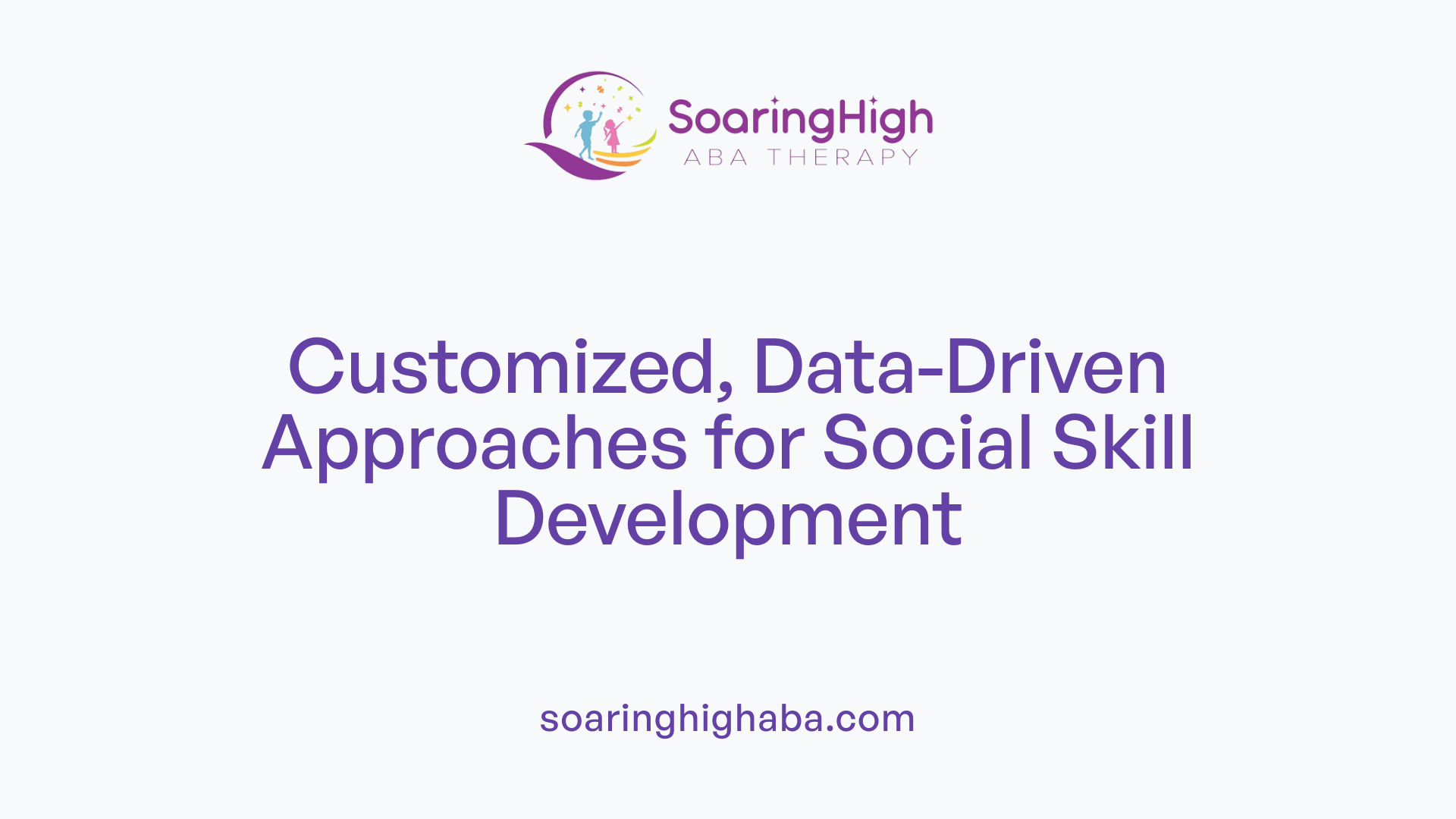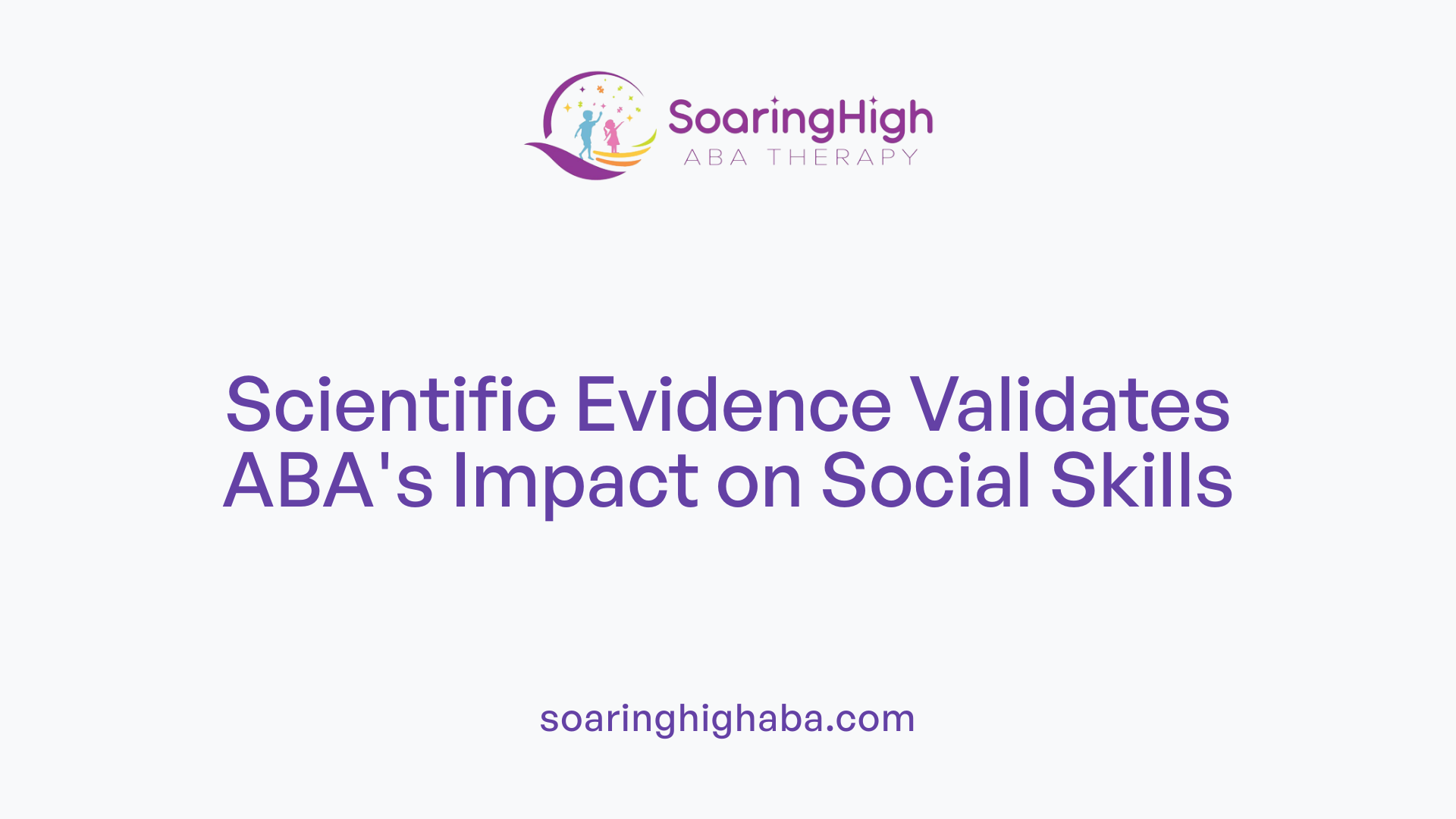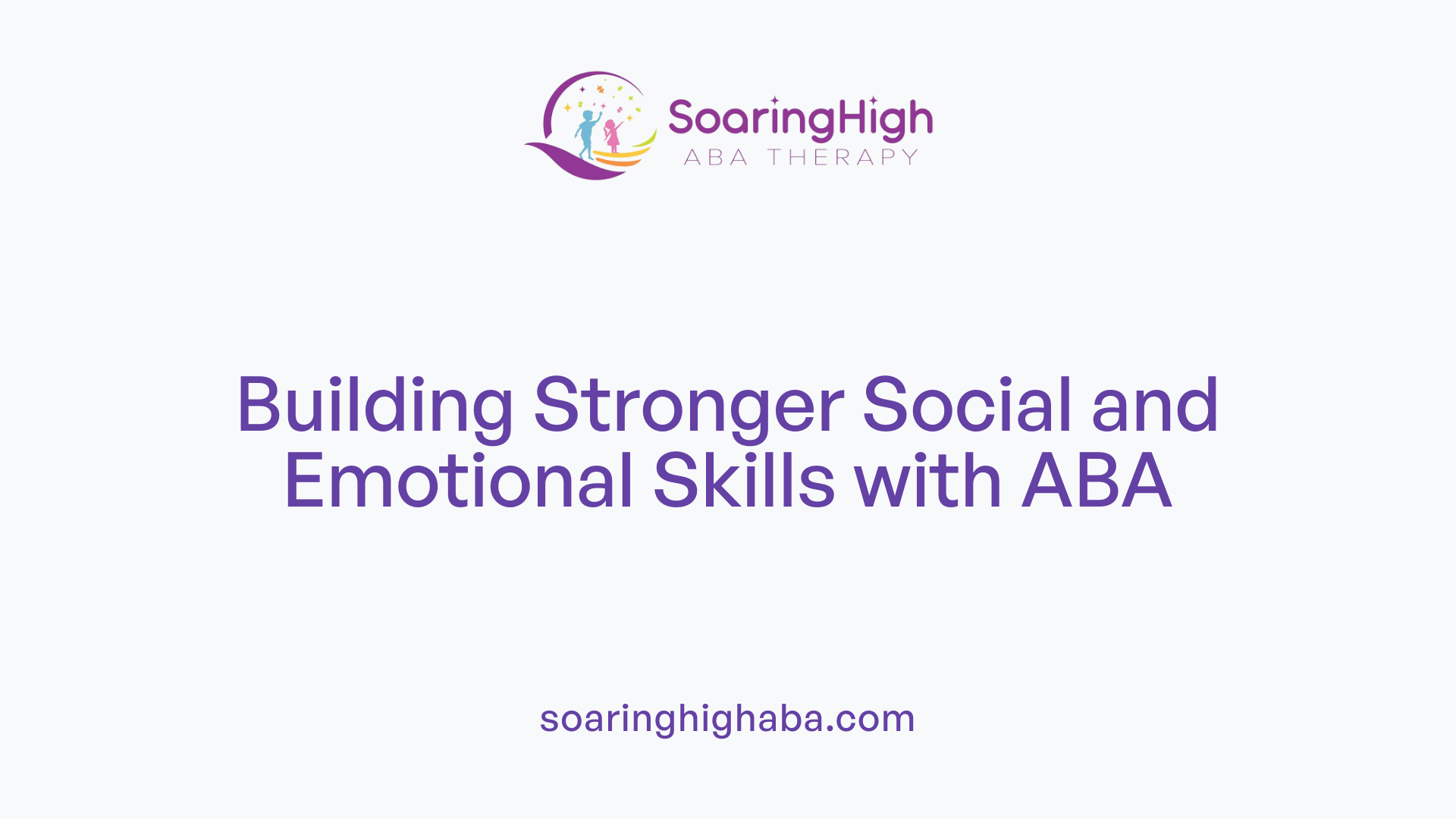Understanding the Impact of ABA Therapy on Social Skills
Applied Behavior Analysis (ABA) is an extensively researched and highly effective therapeutic approach that aids children with autism spectrum disorder (ASD) in developing vital social skills. This article explores how ABA therapy works, the methods it employs, and the significant benefits it offers in fostering social and emotional development.
Foundations and Principles of ABA Therapy for Social Skills

What are the principles and goals of ABA therapy in relation to improving social interaction?
Applied Behavior Analysis (ABA) is grounded in the science of learning and behavior. Its core principle involves understanding how behaviors are influenced by the environment and using this knowledge to bring about meaningful change. In terms of social skills, ABA focuses on identifying specific behaviors that need improvement—such as initiating conversations, understanding social cues, or sharing attention—and systematically teaching these skills.
The primary goals of ABA related to social interaction are to increase helpful social behaviors and reduce problematic ones. For children with autism, this can include encouraging eye contact, promoting turn-taking, and enhancing their ability to respond empathetically. ABA employs individualized programs that break complex social skills into smaller, manageable steps. Each step is taught through techniques like modeling, role-playing, prompting, and positive reinforcement.
Reinforcement plays a vital role; desired behaviors are rewarded with praise, access to preferred activities, or tangible rewards to encourage repetition and mastery. These strategies are applied consistently in real-life settings — both in therapy sessions and in natural environments — wanting skills to transfer and sustain over time.
Overall, ABA aims to improve social understanding, communication, and active engagement. By teaching children how to interpret social cues and respond appropriately, ABA helps them build meaningful connections and participate more fully in social interactions. Its structured, evidence-based approach makes it one of the most effective methods for fostering social growth in children with autism.
Effective Techniques and Methods Used in ABA for Social Development

What methods and techniques are used in ABA therapy to promote social skills development?
Applied Behavior Analysis (ABA) employs a variety of methods and techniques to help children with autism develop social skills effectively. One core approach is Discrete Trial Training (DTT), which breaks complex social behaviors into small, manageable steps, allowing children to learn through repeated, structured practice. This method uses clear prompts and immediate reinforcement to encourage skill acquisition.
Natural Environment Teaching (NET) is another vital technique that focuses on teaching skills within the context of everyday activities. In NET, therapists observe children during natural settings—like play or meal times—and reinforce appropriate social behaviors as they occur naturally. This approach promotes generalization, helping children apply skills across different environments.
Social stories, comic strip conversations, and social scripts serve as visual aids and role-playing tools to teach social cues and appropriate responses. These narratives and visual conversations help children understand social norms and develop empathy by visualizing social interactions.
Video modeling is also widely used, where children watch videos demonstrating desired social behaviors. Watching peers or adults perform appropriate interactions encourages imitation and understanding, which can be practiced later in real settings.
In addition to these, role-playing exercises allow children to practice social scenarios like initiating conversations or sharing, providing a safe environment to experiment and learn.
Visual supports such as checklists and social storyboards help reinforce learning and serve as reminders during daily activities. These supports are crucial for aiding understanding and boosting confidence.
To ensure skills are applied beyond therapy sessions, ABA incorporates real-world practice by involving parents and caregivers. They are trained to reinforce behaviors at home and in community settings.
In summary, ABA uses a tailored combination of structured techniques—DTT, NET, social stories, video modeling, and role-playing—complemented by visual supports and caregiver involvement, to promote social skill development effectively. These methods make learning engaging, adaptable, and applicable across various environments, leading to meaningful social growth for children with autism.
The Role of Personalized Interventions and Data-Driven Strategies

How can ABA therapy help children develop positive social skills?
ABA therapy plays a vital role in helping children on the autism spectrum develop important social skills. Because every child has unique needs, ABA programs are personalized to target specific social challenges and strengths.
One of the main strengths of ABA is its focus on breaking complex social skills into small, manageable steps. For example, children learn to initiate conversations, maintain eye contact, understand social cues, and share attention through structured activities and consistent reinforcement.
Therapists use a variety of techniques such as social stories, comic strip conversations, and social scripts. These tools help children visualize social situations and practice appropriate responses in a safe and controlled environment. Role-playing activities allow children to rehearse social interactions, boosting their confidence and competence.
Positive reinforcement is heavily emphasized — children are rewarded with praise, toys, or access to preferred activities when they demonstrate desired social behaviors. This reinforces those skills and encourages continued practice.
Group settings using peer-mediated instruction offer additional opportunities for children to observe and practice social skills with peers, fostering real-world social interactions.
Crucially, ABA therapy is continuously tailored based on ongoing assessment data. Behavior analysts analyze progress regularly and adjust interventions to ensure the child is acquiring skills effectively and efficiently.
This individualized, flexible approach ensures that therapy targets relevant skills for each child's age and developmental level, promoting better generalization of social abilities across different settings.
Importance of individualized programs
Creating a tailored program ensures that interventions are relevant to the child's specific social difficulties and goals.
Continuous assessment and adjustment
Using detailed data collection, behavior analysts modify strategies to enhance effectiveness and address emerging needs.
Role of behavior analysts (BCBAs)
Qualified professionals design, oversee, and refine interventions, ensuring best practices and measurable progress.
| Aspect | Description | Additional Details |
|---|---|---|
| Customization | Programs are tailored to individual needs | Based on age, skill level, and specific social challenges |
| Data Monitoring | Continuous data collection guides adjustments | Ensures interventions remain effective over time |
| Expert Oversight | BCBAs plan, implement, and evaluate treatment | Usually holding master’s or doctoral degrees in behavior analysis or related fields |
Ultimately, ABA therapy's personalized approach and data-driven strategies significantly contribute to developing social skills, helping children improve their social interactions, build relationships, and increase their confidence in social settings.
Research Evidence Supporting ABA’s Effectiveness

What evidence supports the effectiveness of ABA therapy in improving social skills?
A substantial body of research underscores the positive impact of Applied Behavior Analysis (ABA) on social skills development in children with autism. Studies and clinical trials conducted worldwide have consistently demonstrated that ABA interventions lead to meaningful improvements in social interaction, communication, and daily living skills.
For example, a notable study from China involved children with autism receiving structured ABA therapy. Over six weeks of individual sessions, children showed significant gains in social and communicative behaviors, along with reduced separation anxiety. Such results were measured using standardized tools like the Kindergarten Inventory of Social/Emotional Tendencies (KIST).
Meta-analyses reviewing multiple studies further support these findings, indicating that early and sustained ABA therapy—often ranging from 25 to 40 hours per week over one to three years—can produce moderate to large effects. These effects include enhanced social responsiveness, improved language abilities, better emotional regulation, and greater independence.
ABA employs varied techniques tailored to individual needs, such as Discrete Trial Training (DTT), Natural Environment Teaching (NET), role-playing, social stories, and video modeling. These approaches break down complex social skills—like initiating conversations, understanding social cues, and sharing attention—into manageable steps, making learning more accessible.
Overall, the robust evidence supports ABA as a scientifically validated method for fostering social skills. It not only improves immediate social behaviors but also promotes long-term social engagement, which is crucial for positive relationships and quality of life for children with autism.
| Study Type | Key Findings | Techniques Used | Sample Population |
|---|---|---|---|
| Clinical Trials | Significant gains in social, communication, and daily skills | DTT, NET, Social Stories | Children aged 4-11 with autism |
| Meta-analyses | Large effect sizes on social and language development | Reinforcement, modeling | Various ages and settings |
| Longitudinal Studies | Sustained improvements over years | Parent training, naturalistic teaching | Diverse institutional settings |
This compendium of evidence affirms that ABA therapy remains one of the most validated approaches for enhancing social skills among children on the autism spectrum.
Enhancing Social and Emotional Skills through ABA

What are the benefits of ABA therapy in enhancing social and emotional skills?
Applied Behavior Analysis (ABA) therapy has proven to be highly effective in improving social and emotional skills among children with autism spectrum disorder (ASD). One of its main strengths lies in its focus on strengthening social interactions. Children learn to share, maintain eye contact, and build friendships through structured activities that teach essential social cues and behaviors. Techniques such as modeling, reinforcement, and role-playing are central to these interventions, making social learning engaging and approachable.
Furthermore, ABA helps children develop better emotional regulation. Using methods like natural environment teaching and play therapy, children learn to express their feelings appropriately and adopt coping strategies in various situations. This personalized approach allows therapists to target specific challenges, helping children understand their emotions and respond more adaptively.
The structured, reinforcement-based strategies of ABA enable children to acquire fundamental social skills, including initiating conversations, understanding emotional cues, and engaging in reciprocal interactions. These improvements contribute significantly to their ability to navigate social settings confidently.
Improvements in social and emotional capabilities often translate into better relationships with family and peers. This not only increases children’s independence but also enriches their overall quality of life. Families typically observe positive changes in the child's behavior, emotional stability, and social participation, which can lead to more fulfilling interactions and long-term social success.
In summary, ABA's targeted interventions support children in mastering vital social and emotional skills, fostering happier, more connected lives for children with ASD and their families.
The Transformative Power of ABA in Social Skills Acquisition
ABA therapy represents a scientifically proven, adaptable, and highly effective approach to fostering positive social skills in children with autism. By combining structured learning, reinforcement principles, and personalized strategies, ABA helps children overcome social challenges, build meaningful relationships, and develop the confidence necessary for independent living. As research continues to endorse its efficacy, ABA remains a cornerstone in supporting the social and emotional growth of children on the spectrum, ultimately enhancing their quality of life and lifelong prospects.
References
- The effectiveness of applied behavior analysis program ...
- Applied Behavior Analysis (ABA)
- ABA Therapy for Social Skills Development in Autism
- Social Skills Training in Applied Behavior Analysis? ASD
- How ABA Therapy Improves Social Skills in Children With ...
- Enhancing Social Skills Through ABA Therapy
- ABA Therapy for Enhancing Social Skills





































































































